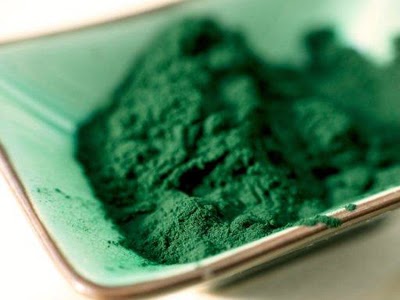Spirulina is a single-celled blue-green algae from the genus Anthrospira that floats freely in highly alkaline waters. Two species of the algae are used to produce spirulina supplements: the Anthrospira platensis and the Anthrospira maxima. The algae are believed to be one of the oldest organisms on our planet. The species used to produce nutritional supplement spirulina are cultivated all over the world in specially designed water farms.
Nutrients
The blue-green algae has been valued as a food source for a very long time. Aztecs discovered its nutritional properties and used it as their staple food. It was also consumed by the Mayas and the Olmecs.
- The blue-green algae is probably the most concentrated source of nutrition. It is the best source of complete protein. It contains 18 amino acids including lysine, threonine, phenylalanine, and methionine.
- It is rich in vitamins, especially of the B group including B12. This makes the spirulina supplements perfect food for vegans whose diet normally does not include sufficient amount of the vital vitamin B12. Some research suggests, however, that the vitamin B12 in spirulina is an analog form of vitamin B12 which is not easily absorbed by the human organism.
- The high chlorophyll content makes it a perfect plant source of bio-available chlorophyll for the human body. Chlorophyll which has a similar structure to human hemoglobin, carries oxygen which enriches our blood, helps to normalize digestion and to keep our intestines healthy.
- The blue-green algae is rich source of minerals. Among others it contains zinc, phosphorus, magnesium, manganese, copper, and selenium. The algae is very high in calcium and iron. Unlike other supplement sources, the iron in spirulina is easily absorbed by the human body. Spirulina is low in sodium and iodine.
- The blue-green algae is high in GLA or gamma linolenic acid, an essential omega-6 fatty acid used by the body to fight allergies, decrease inflammation, and prevent skin damage, among others.
- One of the characteristics of this algae is its high content of carotenoids, especially beta carotene. In fact, its beta caroten content is ten times higher than that of carrots. 10 grams of spirulina provide 23,000 IU of beta carotene which is 460% of the RDA recommendation. It also contains astaxanthin, fucoxantin, and zeaxantin. The total content of mixed carotenoids is about 0.37 per cent.
- The blue-green algae contains very high levels of SOD, or superoxide dismutase enzyme. SOD has a remarkable ability to fight free radicals and to retard aging.
- The algae also contains only 15 to 25 percent of carbohydrates. Two main polysaccharides, glycogen and rhamnose, are easily absorbed by the body and do not cause insulin spikes.
Spirulina as antioxidant
An ongoing research is being conducted all over the world. Spirulina may be the best antioxidant available to us. It is a highly complex superfood. Its high content of mixed carotenoids and the SOD enzyme, as well as selenium, makes spirulina a valuable antioxidant supplement. Spirulina also contains vitamin C and vitamin E which are both known for their antioxidant activity. The antioxidant activity of these nutrients is well researched. They work in synergy and seem to be most effective when acting together. In spirulina they all come in a natural proportion and are not synthetically manufactured to compose an antioxidant formula.
Like beta carotene and selenium, SOD effectively decreases the generation of free radicals in the body and reduces oxidative stress. It fights the superoxide, which is the most ubiquitous and aggressive free radical in the body.
Researchers also found that the algae contains the water soluble phycocyanin, a pigment that gives it its blue hue. Phycocynin is considered to be a free radical scavenger that protects liver and the kidneys from the oxidative damage. Phycocynin is also a powerful immune system modulator and is believed to alleviate the damage caused by radiation. The Russians successfully used spirulina to treat the victims of post-Chernobyl radiation.
Health benefits of spirulina
High nutrient content makes spirulina a superfood supplement. Although there are some conflicting findings, spirulina is generally believed to :
- help control weight
- improve digestion
- detoxify the body
- build muscles
- reduce inflammation
- reduce cholesterol
- enhance immune system
- inhibit viral replication in the body
- lower the risk of certain cancers
- inhibit growth of tumors in the body
- help digestion
- improve the skin
- assist with the PMS
- alleviate malnutrition
Daily dosage
The suggested dosage is 500mg three to four times daily. Total daily dose of spirulina should not exceed 5,000 mg. Spirulina comes in the form of tablets, capsules, or a powder that can be mixed with juice or water, or added into smoothies. Spirulina has a very strong detoxifying effect and may cause Herxeimer reaction* in the body. It is sensible to begin supplementation with a small dose and increase the dosage gradually over a period of few days.
A caution is advised while buying spirulina supplements. Always consider buying spirulina from a certified, organic source as spirulina is subject to contamination. Because some allergic reactions have been observed, consult your health care provider before commencing supplementation. Discontinue use if condition worsens.
By Dominique Allmon
* The Anthrospira species of algae were once classified in the genus Spirulina hence the resulting confusion between the name of a nutritional supplement and the name of a species. Spirulina species belong to a genus of the Cyanobacteria in the Kingdom of Bacteria. In the older literature we still find the terms Spirulina platensis and spirulina maxima.
* Herxheimer reaction occurs in the body when a large amount of toxins flood the body as a result of a rapid detoxification.
Information in this article is for educational purposes only and is not meant to diagnose, treat or cure a disease.

Antioxidant power of spirulina by Dominique Allmon is licensed under a Creative Commons Attribution-NonCommercial-NoDerivs 3.0 Unported License.
